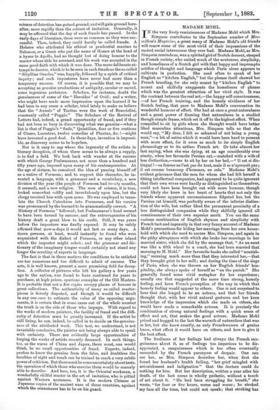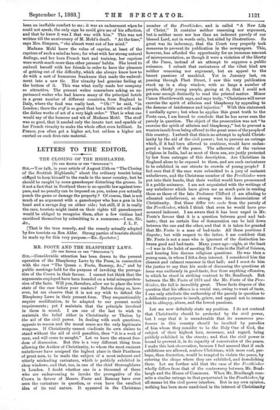MADAME MOHL.
IN the very lively reminiscences of Madame Mohl which Mrs. Simpson contributes to the September number of Mac- millan's Magazine, a great many of Madame Mohl's old friends will renew some of the most vivid of their impressions of the raciest social intercourse they ever had. Madame Mohl, as Mrs. Simpson reminds us, was a spirited girl of Scotch descent, steeped in French society, who united much of the acuteness, simplicity, and homeliness of a Scotch girl with that happy and impromptu artifice of thought and language which Paris alone appears to cultivate in perfection. She used often to speak of her English as "kitchen English," but the phrase itself showed her French breeding, for she only meant by "kitchen English" to accent and skilfully exaggerate the homeliness of phrase which was the greatest attraction of her vivid style. It was the contrast between the real art,—the happy self-consciousness, —of her French training, and the homely vividness of her Scotch feeling, that gave to Madame Mohl's conversation its wonderful humour of effect. She had at once a great naturalness and a great power of framing that naturalness in a studied though simple frame, which set it off to the highest effect. When compelled to sit by girls whom she thought would have better liked masculine attentions, Mrs. Simpson tells us that she would say, "My dear, I felt so ashamed of not being a young man,"—a bit of satire which it would have been hard to present with more effect, for it owes as much to its simple English phraseology as to its artless French art. Or take almost her last saying, when she was dying, at an age considerably over ninety, when her favourite Persian cat,—matched with a wife of less distinction,—came to sit by her on her bed,—" It eat si dig- tingne !—sa femme ne l'est pas du tout, mais il se n'apercoit pas ; il eat comme beaucoup d'hommes, en cela." Madame Mohrs evident grievance that the men for whom she had felt herself a fitting intellectual companion, had appeared to be quite ignorant that their own wives were hardly as distinguished as themselves, could not have been brought out with more humour, though very likely she knew in her heart of hearts that not only the friends whose apparent unconsciousness fidgeted her, but the Persian cat himself, was perfectly aware of the inferior distinc- tion of the wife, but rather liked the permanent proximity of a less distinguished companion while they skilfully ignored all consciousness of their own superior merit. You see the same curious combination of English shyness and simplicity with French tact and ingenuity in that very funny account of Madame Mohl's precautions for hiding her marriage from her own house- hold with which she used to amuse Mrs. Simpson, and again in the pithy abruptness with which she broke her marriage to her married sister, which she did by the message that, "As an aunt was like a fifth wheel to a coach, she had been married that morning to M. Mohl." Her favourite books she called" nourish- ing," meaning much more than that they interested her,—that they brought grist to her mill ; and during the time of the siege of Paris, when she was thrown on her English friends' hos- pitality, she always spoke of herself as "on the parish." She generally found some vivid metaphor for her experience; usually one that suggested at the same time strong, homely feeling, and keen French perception of the way in which that homely feeling would appear to others. One is not surprised to hear that she longed to be an actress, and that her friends thought that, with her vivid natural gestures and her keen knowledge of the impression which she made on others, she would have made a remarkable actress. It is precisely the combination of strong natural feelings with a quick sense of
effect and art, that makes the good actress. Madame Mohl prized and hugged to the last the warmth of naturalism that was in her, but she knew exactly, as only Frenchwomen of genius know, what effect it would have on others, and how to give it the best effect.
The liveliness of her feelings had always the French san-
guineness about it, as of feelings too imperious to be dis- appointed, a sanguineness which is too often eventually succeeded by the French paroxysm of despair. One can see her, as Mrs. Simpson describes her, when first she found her husband's health failing, "her grief mingled with astonishment and indignation" that the doctors could do nothing for him. But her description, written a year after his death, of the last scene is wholly pathetic, without a touch of art about it. "He had been straggling for breath," she wrote, "for four or five hours, worse and worse ; he stroked my face all the time, but could not speak; that stroking has been an ineffable comfort to me; it was an endearment Awn he could not speak, the only sign he could give me of his affection, and that he knew it was I that was with him." This was not written till the anniversary of M. Mohl's death. "At the time," says Mrs. Simpson, "she almost went out of her mind."
.Madame Mohl knew the value of caprice, at least of the caprices of such a mind as hers; for what with her strong natural feelings, and her keen French tact and training, her caprices were worth much more than other persons' habits. She loved to embroil herself with her friends in order to have the pleasure of getting out of the difficulty, which she always knew how to do with a sort of humorous frankness that made the embroil- ment into a new tie. Her vivacity had genuine feeling at the bottom of it. This was what really made her company so attractive. The present writer remembers asking an ex- perienced waiter who had known many of the principal hotels in a great number of different countries, from England to Italy, where the food was really best. " Oh ! " he said, "in London; there the stuff is so good that but a little art will make the dishes works of art of a very high order." That is what one would say of the humour and wit of Madame Mob]. The stuff was so good, that it needed only the innate tact and sparkle of her French vivacity to make the whole effect even brilliant. In France, you often get a higher art, but eellorn a higher art exerted on such first-rate material.



































 Previous page
Previous page